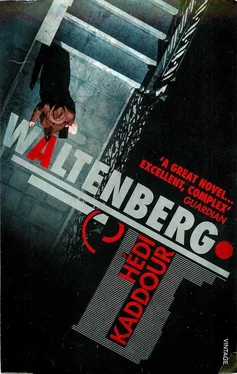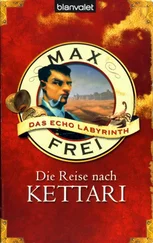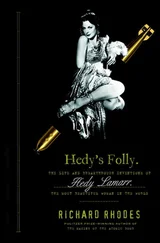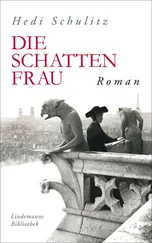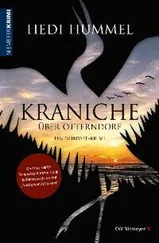Hedi Kaddour - Waltenberg
Здесь есть возможность читать онлайн «Hedi Kaddour - Waltenberg» весь текст электронной книги совершенно бесплатно (целиком полную версию без сокращений). В некоторых случаях можно слушать аудио, скачать через торрент в формате fb2 и присутствует краткое содержание. Год выпуска: 2009, Издательство: Vintage, Жанр: Современная проза, на английском языке. Описание произведения, (предисловие) а так же отзывы посетителей доступны на портале библиотеки ЛибКат.
- Название:Waltenberg
- Автор:
- Издательство:Vintage
- Жанр:
- Год:2009
- ISBN:нет данных
- Рейтинг книги:3 / 5. Голосов: 1
-
Избранное:Добавить в избранное
- Отзывы:
-
Ваша оценка:
- 60
- 1
- 2
- 3
- 4
- 5
Waltenberg: краткое содержание, описание и аннотация
Предлагаем к чтению аннотацию, описание, краткое содержание или предисловие (зависит от того, что написал сам автор книги «Waltenberg»). Если вы не нашли необходимую информацию о книге — напишите в комментариях, мы постараемся отыскать её.
Waltenberg
Waltenberg — читать онлайн бесплатно полную книгу (весь текст) целиком
Ниже представлен текст книги, разбитый по страницам. Система сохранения места последней прочитанной страницы, позволяет с удобством читать онлайн бесплатно книгу «Waltenberg», без необходимости каждый раз заново искать на чём Вы остановились. Поставьте закладку, и сможете в любой момент перейти на страницу, на которой закончили чтение.
Интервал:
Закладка:
But Hans might have suspected something, seen a warning in Lena’s incomprehensible gesture; and, being his friend, Johann even found himself quizzing Hans. Were her shoulders really that straight? Yes, that’s the first thing that struck me, usually women’s shoulders are less prominent, more rounded, Lena’s shoulders are like a boy’s, her body is — how shall I put it? — very firm, she could wear any sort of dress, a dress on her hung as perfectly as in a fashion designer’s illustrations, and yet you could see all her curves, everywhere, she must have gone back to live on the other side of the ocean.
Then the two men talked about rabbits and the place occupied by rabbits in mythology.
By way of defences, vehicles were simply parked in a circle, a large circle, more or less, with the vehicles well spaced out, a rough and ready arrangement, the clearing covered an area of more than fifty hectares, so it would have taken a lot of men.
They were still at war but the hardest battles were over and there was nothing to fear now.
Within a few weeks, following the plan laid down by the general staff, the Kaiser’s army had penetrated deep into French territory, a brilliant strategic breakthrough in the form of a great scything movement through Belgium; four German armies, marshalled as though they were on manoeuvres, had come to a halt and regrouped on the banks of the Marne, which they would cross at any time now, their comrades had not died for nothing, it was the same situation as in 1870, the French forces routed and their President, Poincaré, already falling back on Bordeaux.
You could walk across the fields as if you were back home, wait for the moment when clouds and memories began to invent a woman, while observing the frolicking of frisky rabbits.
Johann talked endlessly about Easter bunnies, the descendants of the rabbits which according to our pagan ancestors escorted the goddess of spring, rabbits with giant testicles, creatures a metre high like pink granite, guarded by priestesses, with sterile women bringing them offerings though I’ve no idea of what, nowadays in my country women bring the healer a pound of butter, a bottle of schnapps and a pair of knickers, and the healer hangs the knickers on a hook in his barn and then proceeds to his fumigations, I’ve no idea if the wives of our pagan ancestors wore knickers or not, the Christian Church burned the priestesses at the stake, but it couldn’t get rid of the rabbits, so it kept them but removed their bollocks and now we send children off to look for them under bushes, not the rabbits, stupid! chocolate rabbits.
The dragoons have bound and gagged Hans, they have knocked him to the ground, they are preparing for one of those charges of which the French cavalry have been masters for centuries. Dragoons arrive from all sides, they line up in ranks of six in the space permitted by the forest track before they burst out in a serried column into the clearing occupied by the Germans.
Riders holding in their mounts, softly uttered commands, the rattle of bared steel, the horses clinking their bits as they try to nibble the young oak leaves at the edge of the copse: a late arrival, medium height, slim, brown hair and large projecting ears, tries to take his place in their ranks, he has a name well suited to the stereotypical Frenchman who tries to travel first class with a second-class ticket, just three syllables, one for his Christian name, two for his surname, the absolute minimum which enables a character to wander about in the wings but is perhaps insufficient to allow him to rise to the front row of what is about to be one of the French cavalry’s most glorious charges.
The Captain of the dragoons eyes his troops who are now formed up, he has two fears: less than a year ago he was in Berlin, on manoeuvres, and saw the German infantry in action. Even through a telescope it had not been easy to pick out feldgrau uniforms against a background of greenery. He has just warned his men to keep their eyes wide open, but has said nothing of his other fear: the Germans are doubtless well-equipped with machine guns like the ones he saw being fired in Berlin.
‘Industrialised death, my dear Jourde,’ the British military attaché, an infantry man, had told him.
The Captain had replied: ‘Oh, the big guns have been getting us used to that for a long time now.’
The attaché had responded with silence.
Later, over a cocktail, with nothing to lead up to it, he said to the Captain:
‘The machine gun spells the end of chivalry.’
And Captain Jourde replied: ‘Not if my dragoons charge with enough ferocity. Don’t forget the new dogma: a shock strike will beat small-arms fire every time.’
Now the Captain groups his men closer together to give their action the semblance of a decisive blow, of a surprise, for surprise is the queen of tactical ploys. You can’t fight the old battles again, Rivoli, Marengo, and the great charges which unseated the enemy at Austerlitz, Jena and especially Prenzlow:
‘Finest charge I ever did see,’ an expert, Prince Murat, would say afterwards.
Entire battles won with a charge, sabres at the ready, there’s no way you can do that any more. There remains the element of surprise: locate the enemy, take him by storm, annihilate him and move on. The Captain has dismissed the sluggard with the second-class ticket and sticking-out ears, Max Goffard by name, it would be much too much of a coincidence to let him appear here, just for the satisfaction of providing Hans with a mirror-image.
Max protests, as a matter of fact Hans and he have coincided in many things of late, and they are not the only ones, and it all comes down to this: coincidence.
If there hadn’t been millions upon millions of coincidences during that summer of 1914, the picturesque scene which is building up would have been replaced by a game of whist in a drawing room hung with tall dark-green curtains or alternatively by the monologue of a man who is about to go to sleep. Max would even agree to get on one of the horses whose backs have been rubbed raw by days and days of chafing and already give off a smell of death, it’s too late now, said the Captain.
But even if it is too late, it matters for Max because of the friendship which is about to begin between him and Hans and will extend over a large slice of a century of which the year 1914 is the baptism of fire. And this coincidence must of necessity take place so that they may talk about it some day, it is this that will give godspeed and strength to their friendship which will end only in 1969, on the banks of the Rhine, when one of these two men will accompany the other to his last resting place, the funeral procession will perhaps pass by hillside, green with the embossed, fleshy-leaved Riesling vines that grow on the banks of the Rhine, a fine variety, in late spring the sheaths covered in a velvet cloak of innumerable fine hairs burst open and reach towards the light in tiny bouquets, the weather is dry and windy, a superb display of blossom, pollen flies up from the flower clusters, insects are busy, fertilisation in two weeks, a sweet smell, then the grapes start to look like fat, opaque marbles, hard and bluey-green, the heat shines on them, the nights turn cold, the days are grey, the sky clouds over with pale vapour, then one morning the wind from the sea spreads a damp mist which glazes the leaves, at noon the sun blazes down, and since last Monday there has been the honey-coloured translucence of grapes ready for picking.
For the funeral in 1969 there will even be a brass band with banners of red and gold, crowds of people, sunshine. And not only that, a beautiful young woman. People will ask who is the woman in the black hat, pearl-grey scarf and the boots, and a voice will say:
Читать дальшеИнтервал:
Закладка:
Похожие книги на «Waltenberg»
Представляем Вашему вниманию похожие книги на «Waltenberg» списком для выбора. Мы отобрали схожую по названию и смыслу литературу в надежде предоставить читателям больше вариантов отыскать новые, интересные, ещё непрочитанные произведения.
Обсуждение, отзывы о книге «Waltenberg» и просто собственные мнения читателей. Оставьте ваши комментарии, напишите, что Вы думаете о произведении, его смысле или главных героях. Укажите что конкретно понравилось, а что нет, и почему Вы так считаете.
